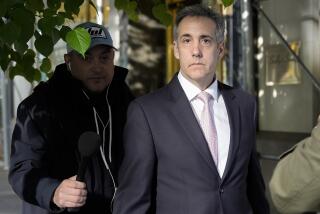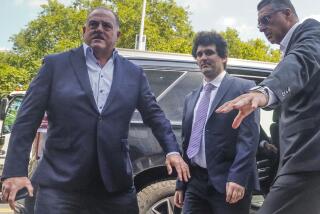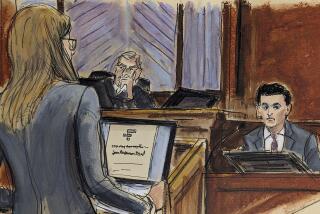Ex-partner testifies against Conrad Black
CHICAGO — Conrad Black’s former business partner, who has already pleaded guilty to fraud, took the stand Monday as the star witness against the fallen media baron and prosecutors began to link the two men as inseparable in running Black’s company.
“I was impressed by Mr. Black’s knowledge and ability and thought he’d be a good partner,” David Radler recalled of his first encounter with Black just before they bought their first Canadian newspaper in 1969.
Black, seated at the defense table, stared straight ahead and did not appear to lock eyes with the man with whom he had worked side by side for years building and then dismantling one of the world’s largest media companies.
“I did not make any major financial decision without consulting Conrad Black,” Radler testified.
Radler, a Canadian citizen who lives in Vancouver, British Columbia, pleaded guilty in the case nearly two years ago in exchange for a 29-month sentence and a promise to testify for U.S. government prosecutors against Black and three codefendants.
On the stand Radler appeared rumpled and wispy-haired, frequently mumbling. He was told to speak up.
“How were major financial and business decisions made?” asked lead prosecutor Eric Sussman.
“They were jointly made,” responded Radler.
“So you worked side by side?” Sussman continued.
“At the time we were equal partners,” Radler responded.
The Canadian-born Black, 62, is charged with racketeering, fraud, money-laundering and obstruction of justice.
A member of Britain’s House of Lords, Black faces as many as 101 years in prison, millions of dollars in fines and $92 million in forfeitures if convicted.
His codefendants face lesser charges, but the four are accused of stealing $60 million from Hollinger International Inc., now a much smaller company known as the Sun-Times Media Group.
“Did you plead guilty to a scheme to steal money from Hollinger shareholders?” Sussman asked Radler.
“Yes, I did ... I pled guilty to fraud. I pled guilty to taking money from Hollinger International under illegal circumstances,” Radler replied.
Radler described how he and Black began buying newspapers in the 1970s. Their empire grew to include such marquee names as the Daily Telegraph of London and the Jerusalem Post, as well as dozens of local U.S. and Canadian papers.
Black and Radler were also principal owners of Ravelston Corp., a privately held Canadian holding company that exercised control over Hollinger International. Ravelston is now in receivership and on March 5 pleaded guilty to fraud in U.S. District Court in Chicago, agreeing to pay a $7-million fine.
Radler testified that as Hollinger sold off newspapers, the management fees that Ravelston could charge Hollinger fell, raising alarms with Black and other defendants.
“We were both concerned with the fact that there was a debt problem at Ravelston,” he said. “We had bank commitments, salary commitments, and we had to take care of both of them.”
Sussman asked: “Did you operate independently of Mr. Black?”
“No, I didn’t,” Radler replied, adding: “Conrad Black had executive responsibility over all of the company and I had operational responsibility.”
Asked if he bought and sold newspapers on his own, Radler said: “I would keep him totally informed about transactions.”
“Would you discuss strategy?” asked Sussman.
“Yes, I would,” Radler said.
Sussman then took Radler through documents and messages Radler sent to Black about deals for and negotiations over Hollinger properties including American Trucker, the Jerusalem Post and U.S. community newspapers.
Defense lawyers have said they intend to portray Radler, who was a key manager of Black’s newspaper empire for more than 30 years, as the real culprit who is lying to save himself.
The trial is in its eighth week. Earlier testimony by newspaper executives, accountants, lawyers and former Hollinger directors has been used to buttress the prosecution’s accusation that Black and the others disguised bonuses to themselves as non-taxed, non-compete payments.
More to Read
Inside the business of entertainment
The Wide Shot brings you news, analysis and insights on everything from streaming wars to production — and what it all means for the future.
You may occasionally receive promotional content from the Los Angeles Times.










